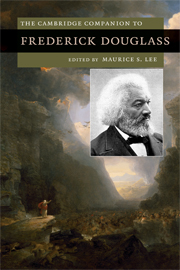Book contents
- Frontmatter
- Introduction
- 1 Douglass’s Self-Making and the Culture of Abolitionism
- 2 Identity in the Autobiographies
- 3 Douglass as Orator and Editor
- 4 Crisis and Faith in Douglass’s Work
- 5 Violence, Manhood, and War in Douglass
- 6 Human Law and Higher Law
- 7 Sentimental Douglass
- 8 Douglass among the Romantics
- 9 Douglass’s Black Atlantic: Britain, Europe, Egypt
- 10 Douglass’s Black Atlantic: The Caribbean
- 11 Douglass, Ideological Slavery, and Postbellum Racial Politics
- 12 Born into Slavery: Echoes and Legacies
- Guide to Further Reading
- Index
3 - Douglass as Orator and Editor
Published online by Cambridge University Press: 28 July 2009
- Frontmatter
- Introduction
- 1 Douglass’s Self-Making and the Culture of Abolitionism
- 2 Identity in the Autobiographies
- 3 Douglass as Orator and Editor
- 4 Crisis and Faith in Douglass’s Work
- 5 Violence, Manhood, and War in Douglass
- 6 Human Law and Higher Law
- 7 Sentimental Douglass
- 8 Douglass among the Romantics
- 9 Douglass’s Black Atlantic: Britain, Europe, Egypt
- 10 Douglass’s Black Atlantic: The Caribbean
- 11 Douglass, Ideological Slavery, and Postbellum Racial Politics
- 12 Born into Slavery: Echoes and Legacies
- Guide to Further Reading
- Index
Summary
Major developments in communications unfolded in the mid-nineteenth-century United States, and Frederick Douglass played a central part. The demand for both lectures and newspapers escalated rapidly between 1800 and 1850, aided by improvements in education and technology, including steam presses, railways, and better roads. The status and numbers of editors and lecturers grew to match. Both lectures and newsprint fed an increasing need for information and opinion, and celebrity in one was often linked to appearances in the other. Douglass’s pre-eminence in these two great nineteenth-century media would have made him remarkable even without his autobiographies; they also comprised the “great schools” in which Douglass’s contemporary Jan Marsh Parker said Douglass received his education: “Methodism, Garrisonianism, Journalism, Political Campaignism.”
Douglass’s rhetorical ability was exceptional even in an age when politics, churches, revivals, and the great reform movements of the 1840s (not the least of which was the antislavery campaign) produced charismatic speakers. All over New England and far into the West, town lyceums held winter lecture courses, and by the 1840s the lyceum circuit drew huge audiences and provided a lucrative living for professional lecturers. Douglass distinguished himself first in the pulpit, then as a promoter of abolition, temperance, and women’s rights. He became a lyceum star with speeches on topics like “Self- Made Men,” “Santo Domingo,” and “Our Composite Nationality”; and he gave the first scholarly commencement address by an African American, presenting “The Claims of the Negro Ethnologically Considered” at Western Reserve College in 1854. In this, and in speeches on the denial of literacy to slaves, Douglass not only challenged the racial assumptions of his contemporaries, but, in James Perrin Warren’s words, cleared “a cultural space in which [African Americans could] speak and write.”
- Type
- Chapter
- Information
- The Cambridge Companion to Frederick Douglass , pp. 46 - 59Publisher: Cambridge University PressPrint publication year: 2009
- 4
- Cited by

